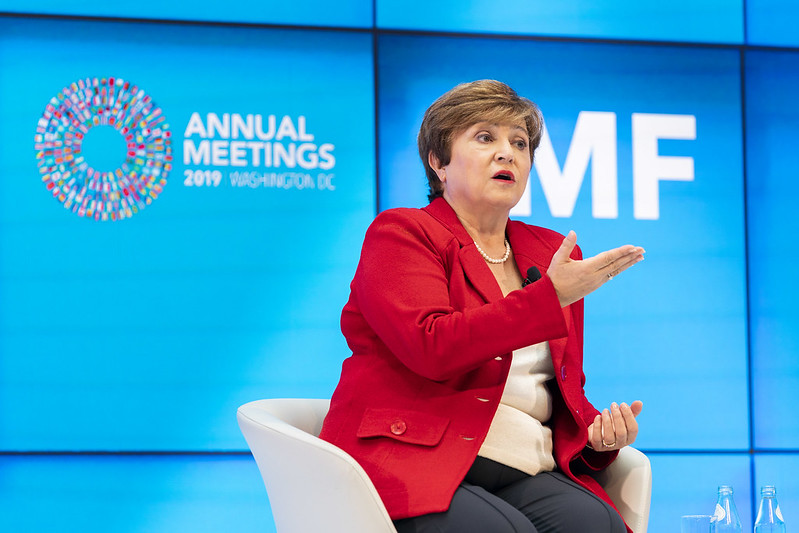
Courtesy IMF Photo/Cory Hancock
Kemi Osukoya
THE AFRICA BAZAAR Magazine
October 8, 2019
Efforts to reverse current synchronized downswing trend in global economy to meet the aspirations of people must include world leaders collaborating to address trade disputes, Brexit and market uncertainty, , said International Monetary Fund’s Managing Director Kristalina Georgieva.
Ms. Georgieva also stated that current downswing, which have brought the global economy to its lowest growth rate since the 2009 financial crisis a decade ago, reflects a complex global market consisting on one hand, 40 emerging market and developing economies forecast to have real Gross Domestic Product growth rates above 5 percent — including 19 sub-Saharan African countries.
On the other hand, despite historic low rates of unemployment in these countries, the so-called trickle-down economic policies of many advanced economies, including the United States, Japan, Germany, and most European nations, have not done enough to alleviate investors’ anxiety about the global market.
“Trade tensions are taking a toll, worldwide manufacturing activity and investment have weakened substantially. There is a serious risk that services and consumption could soon be affected,” warned Ms. Georgieva. “Our goal should be to fix these fractures. Our world is intertwined. So our responses must be coordinated.”
The IMF’s managing director made these remarks Tuesday ahead of the annual World Bank/IMF meetings, which will take place next week at the World Bank and IMF headquarters in Washington D.C., underscoring that the cumulative effect of these trade conflicts could cost the global economy an estimated $700 billion by 2020, or about 0.8 percent of GDP.
“The key is to improve the system, not abandon it,” urged IMF’s chief Ms. Georgieva.
However, Ms. Georgieva remains optimistic that while the current precarious outlook presents many challenges, especially for countries already facing difficulties, favorable agreements could be reached if countries and their leaders, notably the U.S. and China, are willing to work together to find common grounds in their trade disputes, which in turn will help fix some of the current fractures in the global economy.
The IMF’s chief urged all world leaders to collaborate expeditiously to tackle the rifts in the global economy to release trade growth generating capacity before the current trade rifts lead to long-term changes such as “broken supply chains, siloed trade sectors, a ‘digital Berlin Wall’ that forces countries to choose between technology systems,” resulting in a negative lasting effects that last generations.
“Everyone loses in a trade war,” stressed Ms. Georgieva. “So we need to work together now, and find a lasting solution on trade.This requires difficult decisions and political will. But it is worth it. We need real change.”
Ms. Georgieva’s remarks echoed her predecessor’s comments, underscoring that a modern global trading system is the answer to unlock the full potential of services and e-commerce as well as help countries address legitimate concerns relating to their trade practices, including subsidies, as well as intellectual property rights and technology transfers.
“The key is to improve the system, not abandon it. Every country must do more to help communities harmed by the dislocations associated with technology and trade,” urged Ms. Georgieva. “A renewed commitment to international cooperation — and synchronized policy action — can help us more fully address our fractures.”
Adding that a shift to prioritizing domestic good policies such as putting in place structural and fiscal reforms that will help mobilize domestic revenues, raise productivity as well as address financial vulnerabilities such as corruption, not only will unlock resources and fuel new investments, these policies can provide access to new markets, create more opportunities and higher growth that are essential to accelerate growth and build more resilient economies.



